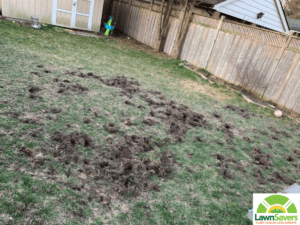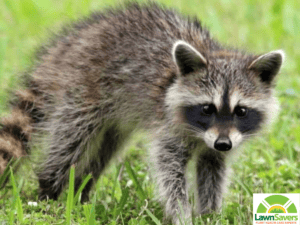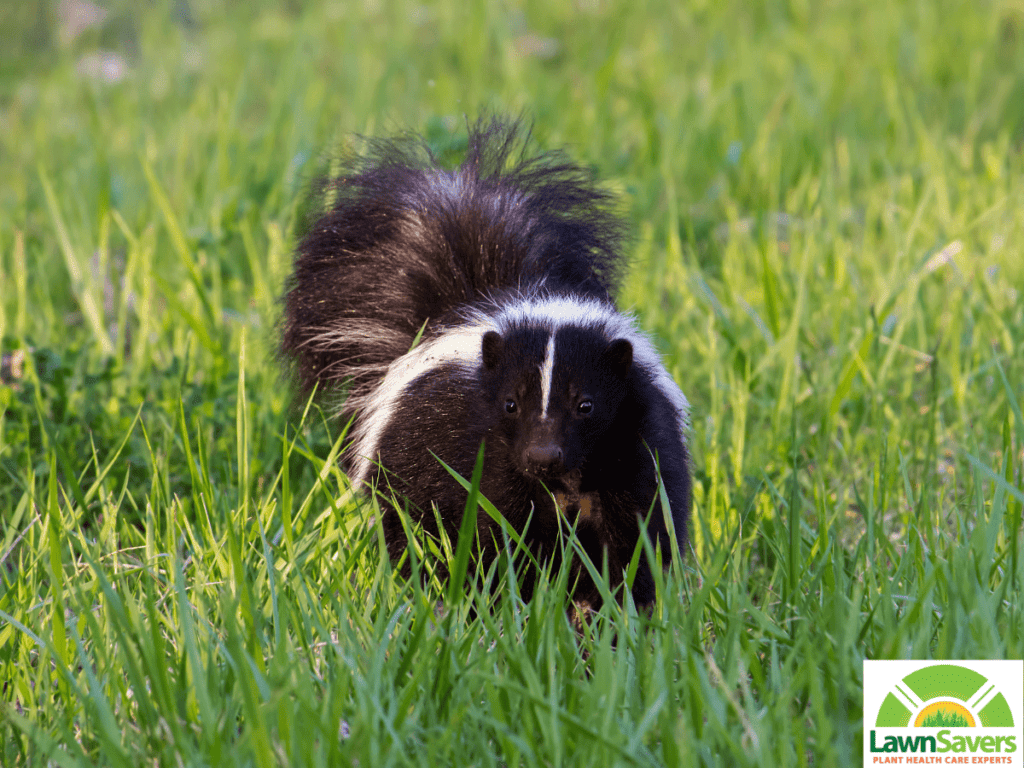TL;DR
-
Problem Identification: Raccoons and skunks dig up lawns searching for grubs, especially when the soil warms in spring.
-
Discouragement Tactics: Make digging difficult by placing chain-link fencing or netting over affected areas.
-
Grub Control: Apply nematodes in late summer or early fall to target young grub larvae; spring applications are ineffective.
-
Lawn Maintenance: Keep soil moist before and after nematode application to enhance effectiveness.
-
Immediate Repair: If turf is flipped, promptly reposition it, water, and apply a root-building fertilizer to prevent further damage.
-
Repellents: Use cayenne pepper, coyote urine, or commercial repellents to deter animals, though results may vary.
-
Long-Term Strategy: Annual preventative grub treatments in late summer or early fall can reduce grub populations and make lawns less attractive to digging animals.
This is the common call of thousands of frantic homeowners every spring to our lawn experts as the soil warms and they look out to find animals have been digging holes in their yard during the night. The first question they want to know is ‘what is digging up my lawn at night?’ Who is the culprit? Those pesky critters, raccoons, or skunks.
 We hate that we have to say ‘we can’t stop the raccoons’, but it is true. Raccoons are smart, stubborn, and have good memories. They will keep flipping up grass so long as they think there might be food underneath, and it is easy for them to do it. But don’t fret, it’s not completely impossible to stop raccoons from digging up your garden or your yard. If you understand the problem, you’re much closer to the solution!
We hate that we have to say ‘we can’t stop the raccoons’, but it is true. Raccoons are smart, stubborn, and have good memories. They will keep flipping up grass so long as they think there might be food underneath, and it is easy for them to do it. But don’t fret, it’s not completely impossible to stop raccoons from digging up your garden or your yard. If you understand the problem, you’re much closer to the solution!
Here’s how to stop skunks & raccoons from digging up your lawn: Make it hard for them to dig, apply nematodes, use aeration, keep the soil wet, use cayenne pepper & unroll chicken wire over the area along with these other 12 tips to help with animals digging up your lawn.
How to Stop Raccoons & Skunks from Digging up My Lawn
 Raccoons won’t waste a lot of effort for no reward, so they can be discouraged. If you make it really hard for them to dig, and keep the amount of food they can find from digging down, they’ll go looking elsewhere. (think chain link fence or netting laid over the top of the area of your yard they are prone to dig)
Raccoons won’t waste a lot of effort for no reward, so they can be discouraged. If you make it really hard for them to dig, and keep the amount of food they can find from digging down, they’ll go looking elsewhere. (think chain link fence or netting laid over the top of the area of your yard they are prone to dig)-
Remember: Nematodes ONLY work on young grub larvae in LATE summer/early fall! ONLY apply Nematodes right when the new eggs have hatched into larvae. Current Nematodes in the market can not kill mature larvae in the Spring (Don’t waste your money!) Grubs move deeper into the soil when the soil temperature is cool, Animals won’t dig 6-8″ down, they want an easy lunch up top in the 1st inch of soil.
- Grub Control with Nematodes is certainly part of the fix. Getting a preventative treatment every year in August or September – especially in neighbourhoods known to have grub (and skunk and raccoon) problems – will not only keep your grass well-rooted and hard to flip up, but will prevent a bumper crop of grubs from eating your roots and turning your lawn into a raccoon buffet. Rooting of the grass is key because it makes digging difficult.
- Keep the soil wet before AND after the Nematodes are applied.
- If skunks or raccoons do flip up the turf, fold it back ASAP before it dries out, water it and get a root-building fertilizer on it. It’s important to avoid further turfgrass death from raccoons trying to pull up your sod.
- Cayenne pepper, coyote urine (or ‘marking your territory’ yourself!) or commercial repellents are all ‘somewhat’ effective. (hit and miss)
- If your lawn is small enough, unrolling chicken-wire over the areas where the raccoon’s like to dig can frustrate them. Just remember to move it every few days so it doesn’t grow into the lawn.
- We recommend a motion-activated sprinkler like “the scarecrow” that blasts the furry bandits with cold water when they walk into detecting range.
- Prevention is key when it comes to stopping raccoons and skunks from tearing up your yard at night. Focus on developing healthy turf with strong roots through proper nutrients, aeration and over-seeding. A thick, healthy well-rooted lawn with proactive care is the best answer to avoid the frantic call of “may-day”!
- Understand the problem: They arent just flipping over your lawn, they look under wood and anything else providing a cool dark home for insects. The turf is flipping up easy because the grub larvae ate the roots all last fall, AND/OR you have a weak rooted lawn or grass secpeies present. Digging does not mean they found anything!
- Animals digging is a symptom, and usually means there are grubs underneath BUT it’s not always the case – confirm visually the presence and number of grubs in a small 1 sq. ft. patch dug 6-8 inches deep.
- Vole tracks that you see in the spring are not indicative of grubs. In fact, Voles are vegetarians and do not eat grubs. For more information see: Voles in my lawn
There are no guarantees when it comes to trying to stop raccoons or skunks from digging up your lawn and trying to get them to stop wrecking your grass, but a good combination of these tools and techniques should discourage them enough that your lawn isn’t destroyed.
Call the lawn care experts near you at LawnSavers to help you get your lawn green & healthy and fighting off grubs proactively & naturally!
FAQ About Best Lawn Care Practices
🌱 How Many Times a Week Should You Water Your Lawn?
You need to water at least once a week for at least an hour, this generally provides 1-1.5″ of water to the roots (a tuna cans height) (exceptions: 1. when you seed & 2. if you have an automated system 3. When we are experiencing extreme heat).
New Seeding Watering: Seed must be kept moist until established. This will be influenced by the amount of sun, wind and heat you are experiencing in your particular area. It is normal to require 3-4 short waterings per day to maintain a moist seedbed. Use a light stream of water to lessen disturbance of the seedbed.
🌱 What is Aeration?
Natural aeration is the process of air exchange between the soil and its surrounding atmosphere. Sometimes this process needs a little help, and that is where liquid aeration, the process of either applying a blend of soil enhancing materials OR mechanically removing small plugs of thatch and soil from the lawn, is used to improve soil aeration.
🌱 What is the Proper Height to Mow Grass To Keep It Healthy?
In the spring (May-June) and fall (September-November), your lawn should be kept at the 2.75 – 3-inch mark and in the hotter and drier summer periods at least 3 inches. Contrary to popular belief, if you cut the lawn shorter it doesn’t make it grow at a slower rate, it can actually cause it to lose moisture and scorch.

Check out our 682+ reviews on HomeStars where we have an average 9.4/10 rating.
Here’s what R Frech from Markham said on Google:
“LawnSavers has been taking care of my lawns for over 10 years and I am extremely pleased with the service. They keep me well informed of scheduled treatments and steps I can take to improve the results. The technicians are professional, knowledgeable, and friendly and their customer service team is top-notch. You will not be disappointed.”,
Rating: 5/5










